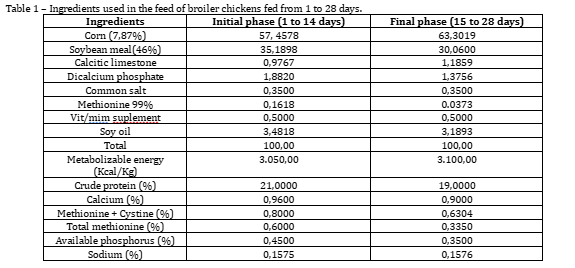Probiotics composed of Bacillus spp. in the litter and feed of broiler chickens
DOI:
https://doi.org/10.21708/avb.2024.18.3.12352Resumo
Adding probiotic microorganisms to broiler diets can help improve health status and zootechnical performance throughout the production period. This study aimed to evaluate the effects of Bacillus amyloliquefaciens probiotic strains and the composition of Bacillus subtilis and Bacillus toyoi on their ability to colonize the intestine and litter of broilers. The morphometric aspects of the duodenal villi and zootechnical performance were also evaluated. The treatments were assigned in a complete randomized design. A total of 300 one-day-old male Cobb broiler chicken was used in five treatments, with four replicates each. The birds were housed in batteries of experimental cages (100 x 80 cm), and the leftover feed was weighed
weekly to calculate body weight gain, intake, and feed conversion ratio. Two birds from each replicate were euthanasied to determine the Bacillus spp. count in the feces of the intestinal content and samples were also collected from the poultry litter (wood shavings of Pinnus elliottii) to determine Bacillus spp. in different days. The duodenal segments of birds were analyzed to evaluate intestinal morphometry (crypts and villi). There was no change in microbiota characteristics or zootechnical per
formance between the treatments. In conclusion, commercial probiotic control treatment showed positive results, such as better intestinal colonization and greater presence of probiotic strains in the litter. These effects can result in better performance of birds in situations where field challenges occur.
Downloads

Downloads
Publicado
Edição
Seção
Licença
Copyright (c) 2024 Acta Veterinaria Brasilica

Este trabalho está licenciado sob uma licença Creative Commons Attribution 4.0 International License.
Autores que publicam na Acta Veterinaria Brasilica concordam com os seguintes termos: a) Autores mantém os direitos autorais e concedem à revista o direito de primeira publicação, com o trabalho simultaneamente licenciado sob a Licença Creative Commons Attribution que permite o compartilhamento do trabalho com reconhecimento da autoria e publicação inicial nesta revista. b) Autores têm autorização para assumir contratos adicionais separadamente, para distribuição não-exclusiva da versão do trabalho publicada nesta revista (ex.: publicar em repositório institucional ou como capítulo de livro), com reconhecimento de autoria e publicação inicial nesta revista. c) Autores têm permissão e são estimulados a publicar e distribuir seu trabalho online (ex.: em repositórios institucionais ou na sua página pessoal) a qualquer ponto antes ou durante o processo editorial, já que isso pode gerar alterações produtivas, bem como aumentar o impacto e a citação do trabalho publicado (Veja O Efeito do Acesso Livre).


 Esta obra está licenciada com uma Licença
Esta obra está licenciada com uma Licença 